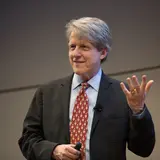
The Historian’s Notebook: What Was Business Education at Yale Like before SOM?
SOM opened its doors in 1976. But the history of business education at the university stretches back over a century.
The Historian’s Notebook: 50 Years of Business & Society is a blog series created in preparation for the 50th anniversary of Yale SOM in September 2026. The series is written by Yale SOM’s resident historian, Michelle Spinelli. Reach out if you have an idea for a blog post, memories or photos to share, or an inquiry about SOM history.
Although the history of Yale SOM—from its opening in 1976 to today—is a relatively short one, the story of “business” education at Yale University hearkens back to the mid-19th century. This installment of the Historian’s Notebook explores the development of management education at the university, including a graduate program at Yale’s Sheffield Scientific School that became a precursor to SOM.
Sheffield Scientific School, founded in 1847 as the Yale Scientific School, originally offered a three-year bachelor of philosophy degree (PhB) to Yale students pursuing the applied sciences. It expanded its offerings to include a PhD degree in 1861. Yale College was different in that it provided undergraduates with a more classical course of study that included Greek and Latin.
In 1860, however, Sheffield inaugurated what was called the General Course. Its curriculum provided a more liberal undergraduate education for men wishing to pursue careers outside the sciences. Many of these students eventually pursued careers in business and law.
The General Course evolved into the Select Course in Scientific and Literary Studies in 1864. Students spent most of their first two years studying a traditional curriculum of natural and physical sciences, along with some coursework in history and modern languages. The third year, however, was “truly a curiosity,” according to Russell Chittenden, a member of the Class of 1875 and the last director of the school, because students had the opportunity to enroll in a business class—Commercial Law. This was the first business class to be offered at Yale.
With industry changing and expanding rapidly into the 20th century, Sheffield became more mindful of the need to train individuals in business. School leaders realized that, with “some industrial experience,” alumni would be well-qualified for managerial positions. To better prepare students for such careers, the school began offering classes in industrial organization at the turn of the century.
Course offerings in business expanded dramatically in 1914, when Frederick W. Vanderbilt, a member of the class of 1876, and a second anonymous alumnus donated a total of $200,000 to establish a graduate program in business administration. This program was to be the capstone of the Select Course. Graduate classes focused on market distribution, business finance, insurance, accounting, statistics, industrial organization and management, business law, and investments. The program ran for two years, starting in 1915.
When the United States joined World War I in 1917, however, Yale was forced to prioritize military training over graduate studies, and the graduate program in business administration at Sheffield was paused. Two years later, in 1919, the university underwent a major reorganization and terminated the program. All graduate education was transferred to the graduate school, and all undergraduate courses in the humanities were moved to Yale College. With those changes, Sheffield became exclusively an undergraduate school for students pursuing engineering and the professional sciences.
A few decades later, starting in 1956, the Yale School of Engineering offered what was called a Master of Industrial Administration (MIA) degree, with a focus on industry and production—although the curriculum included such management-focused courses as organizational behavior and corporate finance. When the School of Engineering closed in 1961, the MIA program moved to the Department of Administrative Sciences and evolved into a Master of Arts with a specialization in either behavioral science or operations research, each emphasizing technical expertise. The last of these degrees was conferred in 1973, just three years before the opening of SOM.



